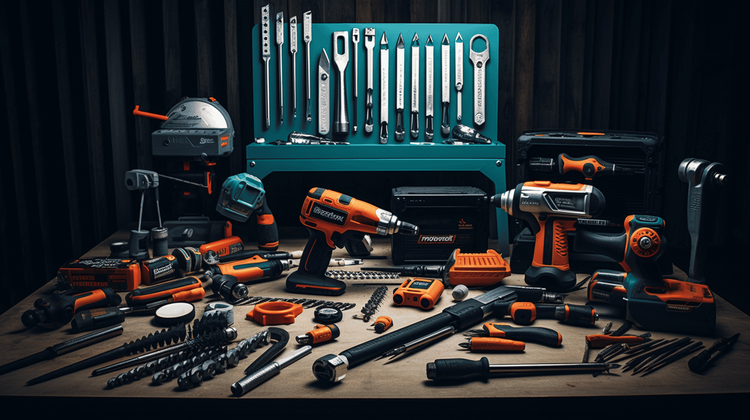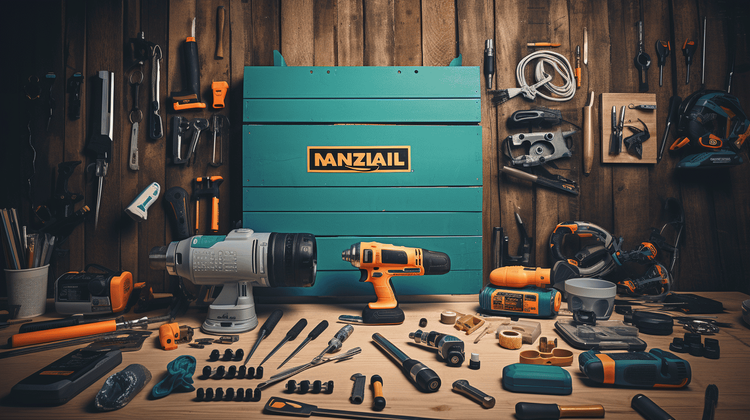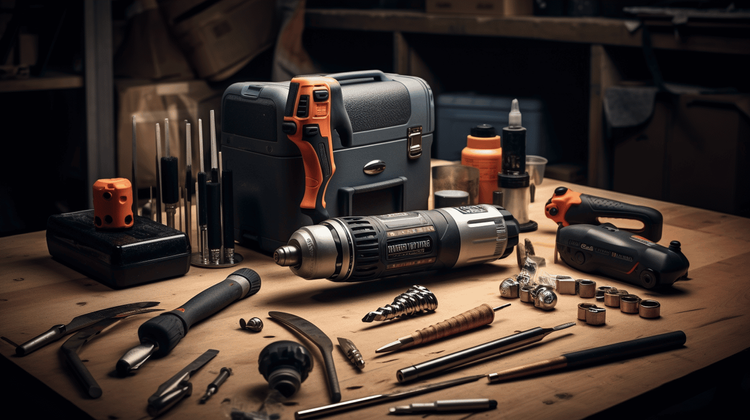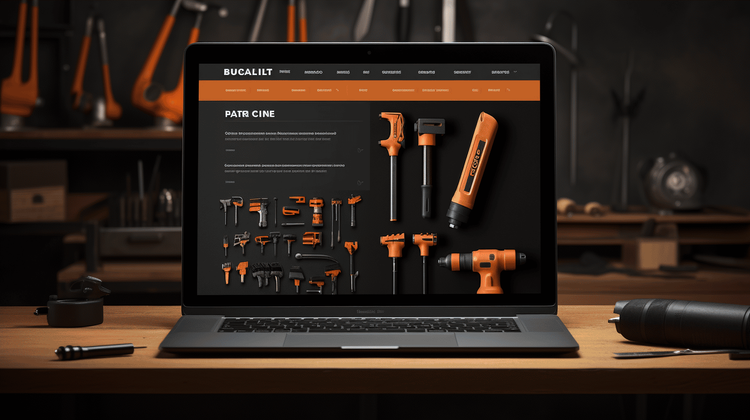Affordable DIY: Tips for Finding Budget-Friendly Tools and Equipment

Welcome to the world of DIY! Whether you're a seasoned home improvement enthusiast or just starting out on your DIY journey, one thing is for sure - having the right tools and equipment is essential. But, finding budget-friendly tools and equipment can be a challenge.
The good news is that you don't have to break the bank to get the tools you need. In this article, we will explore some tips and tricks to help you find affordable tools and equipment for your DIY projects. From exploring local hardware stores to shopping online and considering buying used equipment, we've got you covered. So, let's dive in and discover how you can save money without compromising on quality.
Determining Your DIY Needs
When you embark on a DIY project, it's essential to determine the tools and equipment you'll need. This will help you stay organized and ensure that you have everything necessary to successfully complete your project. Here are some tips for determining your DIY needs:
Assessing Your DIY Projects
Before you start researching tools and equipment, take some time to assess your DIY projects. Consider the following:
- What type of projects do you plan to tackle? Is it woodworking, home improvement, or something else?
- How frequently do you plan to engage in DIY projects?
- Are you a beginner or do you have experience in DIY?
Answering these questions will give you a clear understanding of the type and frequency of projects you'll be working on, and will help you determine the tools and equipment you require.
Researching Tools and Equipment Requirements
Once you have a clear idea of the projects you'll be working on, it's time to research the specific tools and equipment you'll need. Consider the following steps:
- Make a list: Create a list of the tools and equipment you think you'll need based on your DIY projects. Think about the basic tools you'll require, such as hammers, screwdrivers, and measuring tapes.
- Do your homework: Research online or consult DIY books and guides to get an idea of the essential tools and equipment for your specific projects. Websites like Pinterest and YouTube can also provide valuable information and inspiration.
- Evaluate your budget: Determine how much you are willing to spend on tools and equipment. This will help you prioritize your purchases and find affordable options.
- Seek expert advice: If you're unsure about specific tools or equipment, reach out to professionals or experienced DIYers for advice. They can offer valuable insights into what tools are essential and what alternatives can be used.
By taking these steps to determine your DIY needs, you'll be well-prepared to move on to the next stage of finding budget-friendly tools and equipment.
Exploring Local Hardware Stores
When it comes to finding budget-friendly tools and equipment for your DIY projects, exploring local hardware stores can be a great option. Not only do these stores offer a wide range of tools and equipment, but they often have competitive prices and special deals that can help you save money. Here are some tips to make the most of your visit to the hardware store:
Comparing Prices
One of the advantages of visiting a physical hardware store is that you can compare prices for different tools and equipment right on the spot. Take the time to browse the aisles and shelves, and make note of the prices for the items you need. This will allow you to see if there are any price differences between brands or models, helping you make an informed decision.
Looking for Discounts and Deals
Hardware stores often have special discounts and deals that can help you save even more money. Keep an eye out for signs or flyers advertising sales, clearance items, or package deals. These promotions can be a great way to get the tools and equipment you need at a lower cost. Don't hesitate to ask the staff about any ongoing or upcoming promotions – they may have additional information to share.
Pro Tip: If you're a frequent DIYer, consider signing up for the hardware store's loyalty program. These programs often offer exclusive discounts and rewards that can add up over time.
Checking Online Websites
Many hardware stores have an online presence where you can browse their inventory and even make purchases. While the prices online may be similar to the in-store prices, there might be online-exclusive deals or promotions that you can take advantage of. Additionally, online reviews and ratings can help you make an informed buying decision by giving you insights into the quality and performance of the tools and equipment.
Pro Tip: Before making a purchase online, check if the hardware store offers in-store pickup. This can save you on shipping fees and allow you to inspect the tools and equipment before taking them home.
Engaging with Store Staff
Don't underestimate the value of the knowledge and expertise of the store staff. If you're not sure which tools or equipment are best suited for your DIY project, don't hesitate to ask for advice. Explain your project and your budget constraints, and the staff may be able to recommend budget-friendly alternatives or suggest tools that have multiple uses.
Remember, when exploring local hardware stores, it's important to keep an open mind and be flexible. Sometimes, you may discover alternative tools or equipment that serve the same purpose at a lower cost. By being savvy in your search, you can find affordable options without compromising on quality.
Shopping Online for Budget Tools
When it comes to finding budget-friendly tools and equipment for your DIY projects, shopping online can be a great option. Online shopping offers convenience, a wide range of choices, and the opportunity to compare prices from different sellers. Here are some tips for finding affordable tools and equipment online:
Checking Auction Websites
Auction websites like eBay can be treasure troves for finding affordable tools. Here's how you can make the most of them:
- Monitor the auctions: Keep an eye on ongoing auctions to snag deals when prices are low.
- Set a budget: Decide on your maximum bid ahead of time to avoid overspending.
- Read the descriptions carefully: Ensure you understand the condition of the item and any additional costs like shipping or handling fees.
- Check the seller's reputation: Look for sellers with high ratings and positive reviews to ensure a smooth transaction.
- Consider refurbished or used tools: Many auction websites also offer refurbished or used tools that are still in great working condition at lower prices. Just be sure to read the descriptions and ask questions if needed.
Online Marketplaces
Another option for finding budget tools online is to explore online marketplaces like Amazon or Walmart. Here's how to make the most of these platforms:
- Compare prices: Use the search function to compare prices from different sellers. Sometimes, the same tool can have a significant price difference between sellers.
- Read product reviews: Take the time to read product reviews from other buyers to get an idea of the quality and performance of the tool you're interested in.
- Look for deals and discounts: Online marketplaces often have deals, discounts, or coupons that you can apply to your purchase. Keep an eye out for these promotions to save even more money.
- Consider bundle deals: Some sellers may offer bundle deals where you can purchase a set of tools at a discounted price. If you need multiple tools, these bundle deals can be a great way to save money.
Overall, shopping online for budget tools can be an efficient and cost-effective way to find the tools and equipment you need for your DIY projects. Just be sure to do your research, read reviews, compare prices, and take advantage of any deals or discounts available. Happy shopping!
"Shopping online for budget tools can be a great way to save money on your DIY projects. By checking auction websites and exploring online marketplaces, you can find affordable tools and equipment without breaking the bank."
Consider Buying Used Equipment
When it comes to finding budget-friendly tools and equipment for your DIY projects, one option worth considering is buying used equipment. While brand-new tools may come with a higher price tag, purchasing used tools can help you save money without compromising on quality. Here are some tips to guide you in finding and buying used equipment:
Attending Garage Sales and Flea Markets
One great way to find used tools and equipment is by attending garage sales and flea markets in your local area. Many people use these events to sell unused or lightly used tools at a fraction of their original price. It's a win-win situation, as you get affordable tools while the seller clears up space.
Tips for attending garage sales and flea markets:
- Check online platforms or local newspapers for upcoming garage sales and flea markets.
- Arrive early to get the best selection.
- Inspect the tools carefully before purchasing to ensure they are in good working condition.
- Negotiate the price when appropriate, as sellers may be willing to lower the price.
Searching for Second-Hand Tools Online
In addition to physical events, there are numerous online platforms where you can find and buy used tools and equipment. Websites like Craigslist, eBay, and Facebook Marketplace are popular options for individuals looking to sell their pre-owned tools.
Tips for searching for second-hand tools online:
- Use specific search terms to narrow down your options and find the tools you need.
- Read the seller's description and examine the photos provided to assess the condition of the tools.
- Ask the seller any questions you may have before making a purchase.
- Meet the seller in a safe and public place when arranging to pick up the item.
Benefits of buying used equipment
Opting for used tools and equipment can offer several benefits to DIY enthusiasts:
- Cost savings: Used tools are typically priced lower than new ones, allowing you to save money that can be allocated for other projects or tools.
- Quality at a lower price: Many tools are built to last, so buying used doesn't necessarily mean sacrificing quality. You can often find high-quality tools in excellent condition at a lower cost.
- Vintage and unique options: Used tools and equipment can sometimes include vintage or unique pieces that may add character to your projects.
- Environmental sustainability: Buying used tools is an environmentally friendly choice. By giving a second life to tools, you reduce waste and lower your carbon footprint.
Remember, when buying used equipment, it's essential to inspect the tool's condition carefully and ensure it meets your needs. By considering this cost-saving option, you can build up your toolbox without breaking the bank.
DIY Tool Rental Options
If you're a DIY enthusiast but don't want to invest in buying new tools and equipment, renting them can be a great cost-saving option. Tool rental allows you to access a wide range of tools and equipment without the hefty price tag of purchasing them outright. Here are some DIY tool rental options you can explore:
Exploring Local Tool Rental Shops
One of the most convenient ways to rent tools is by visiting your local tool rental shop. These rental shops offer a variety of tools and equipment for different DIY projects. Here's why exploring local tool rental shops is a great option:
- Convenience: Local tool rental shops are easily accessible and allow you to rent the tools you need for the duration of your project.
- Wide Selection: Rental shops usually have a wide selection of tools, ranging from power tools like drills and saws to specialized equipment like floor sanders or pressure washers.
- Quality Assurance: Rental shops generally maintain their tools well, ensuring that the equipment you rent is in good working condition.
- Expert Advice: The staff at rental shops are knowledgeable about different types of tools and can help you choose the right equipment for your specific DIY project.
Sharing Tools with Friends and Neighbors
Another affordable option for DIY tool rental is to share tools with friends and neighbors. Here's why this can be a win-win situation:
- Cost Savings: Sharing tools with others allows you to split the cost of purchasing and maintaining the equipment.
- Community Building: Sharing tools with friends and neighbors can foster a sense of community and promote friendship and cooperation.
- Access to a Wider Range of Tools: When you share tools, you can access a wider range of equipment that you may not have considered purchasing on your own.
- Convenient and Flexible: Borrowing tools from friends and neighbors is often more convenient and flexible than renting from a shop, as you can borrow the tools for longer periods if needed.
Remember to establish clear communication and guidelines for borrowing and returning the tools, and be sure to show gratitude by returning the tools in good condition and offering to help with maintenance or repairs if needed.
So, whether you prefer renting tools from a local shop or sharing them with friends and neighbors, DIY tool rental is a cost-effective option that allows you to complete your projects without breaking the bank. Take advantage of these options to save money on tools and equipment while still enjoying the satisfaction of completing your DIY projects.
Remember, the goal is to make your DIY experience affordable and enjoyable!
Alternative Cost-Saving Measures
When it comes to DIY projects, finding affordable tools and equipment is crucial for staying within your budget. Fortunately, there are alternative cost-saving measures you can take to make your DIY endeavors more affordable. Here are some tips:
Renting Instead of Buying
Instead of purchasing expensive tools and equipment that you may only need for a single project, consider renting them. Renting allows you to access high-quality tools without the hefty price tag. Many hardware stores and specialized equipment rental shops offer a wide range of tools and equipment for rent. Some benefits of renting include:
- Cost-effective: Renting tools is usually more affordable than buying them, especially for specialized equipment that you may only need once.
- No maintenance: When you rent, you don't have to worry about the costs and hassles of maintaining and storing the equipment.
- Access to professional-grade equipment: Renting allows you to use high-quality professional-grade tools that you might not be able to afford otherwise.
Using Tools for Multiple Projects
Another cost-saving measure is to maximize the use of your tools for multiple projects. Instead of purchasing specialized tools for every task, look for versatile tools that can handle a variety of jobs. This way, you can stretch your budget and get more value out of your investments. Some examples of versatile tools include:
- Multi-purpose power tools: Tools like oscillating multi-tools, combination power drills, and rotary tools can perform multiple functions, saving you money and space.
- Interchangeable attachments: Look for tools that offer interchangeable attachments or blades, allowing you to use them for different purposes.
- Invest in quality: By investing in high-quality tools that can withstand heavy use, you can ensure they will last for multiple projects, saving you money in the long run.
Remember, taking good care of your tools and properly maintaining them will also help extend their lifespan and save you from unnecessary expenses.
So, if you’re looking to save money on your DIY projects, consider renting tools instead of buying them and make the most out of versatile tools to minimize your expenses. With these alternative cost-saving measures, you can keep your DIY dreams alive without breaking the bank.
Conclusion
In conclusion, finding budget-friendly tools and equipment for your DIY projects doesn't have to be a daunting task. By following the tips and strategies outlined in this article, you can save money without compromising on quality. Remember to:
- Determine your DIY needs and research the specific tools and equipment required.
- Explore local hardware stores and compare prices to find the best deals.
- Take advantage of online shopping platforms and auction websites for discounted options.
- Consider buying used equipment from garage sales, flea markets, or online platforms.
- Explore DIY tool rental options at local shops or share tools with friends and neighbors.
- Implement alternative cost-saving measures, such as renting instead of buying or using tools for multiple projects.
By taking the time to plan and research, you can find affordable tools and equipment that will help you successfully complete your DIY projects without breaking the bank. So go ahead, unleash your creativity, and embark on your DIY journey with confidence! Happy DIYing!
Frequently Asked Questions
- Where can I find budget-friendly tools and equipment?You can find budget-friendly tools and equipment at various places such as online marketplaces like Amazon, eBay, and Craigslist, local garage sales and auctions, rental stores, and even borrowing from friends or family.
- Are second-hand tools and equipment a good option for saving money?Yes, second-hand tools and equipment can be a great option for saving money. Just make sure to thoroughly inspect them for any damages or defects before purchasing. Check for warranties or return policies, if available.
- What features should I prioritize when looking for affordable tools and equipment?When searching for affordable tools and equipment, prioritize quality, durability, and functionality. Focus on finding tools that would specifically serve your needs and offer good value for the price.
- How can I get the best deals on tools and equipment?To get the best deals on tools and equipment, compare prices from different sellers, wait for seasonal sales and promotions, sign up for newsletters or alerts from online stores, and consider buying in bulk or bundled deals.
- Should I invest in multi-purpose tools or buy individual tools for each task?It depends on your specific needs and budget. Multi-purpose tools can be cost-effective and save storage space, but if you have specific tasks that require specialized tools, buying individual tools may be a better option.




